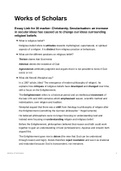Summary
Summary A level Religious Studies Edexcel: Works of Scholars
- Module
- Unit 5 - Works of scholars
- Institution
- PEARSON (PEARSON)
These notes helped me to achieve an A* and summarises the following: - what religious belief is - the enlightenment - Freud and Marx (psychology and sociology) - Darwkin's (science) - postmodernism -criticisms and strengths
[Show more]



